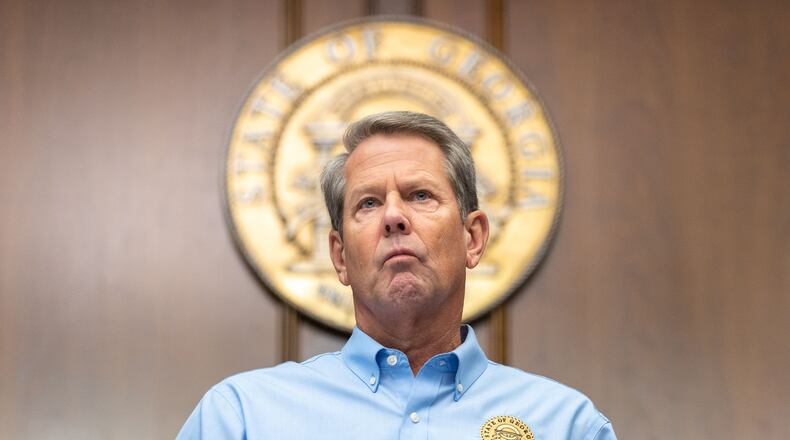Georgia’s top court cast a Republican-backed law into uncertainty Friday when it raised legal concerns about a new oversight commission with the powers to sanction or oust wayward prosecutors.
The Georgia Supreme Court asked the state’s attorneys to answer a key constitutional question: whether the court has the legal authority to approve rules setting up the commission, as required by the state law.
“Before taking action on the standards and rules, the Court must first assure itself that it has power to do so,” the two-page order states. “The Court is limited to exercising only the judicial power that the Georgia Constitution vests in it.”
The court’s narrow question didn’t seek to resolve the broader issue of whether state lawmakers overstepped their authority by establishing the panel, as a bipartisan group of district attorneys argued in a separate legal challenge that’s pending in Fulton County Superior Court.
But the court’s order could temporarily halt the commission from taking action on complaints against prosecutors, at least until lawmakers revisit the legislation and, potentially, remove the Georgia Supreme Court from the process.
The future of the law is being closely watched in Georgia and beyond, partly because allies of Donald Trump want the commission to sanction Fulton County District Attorney Fani Willis for seeking election interference charges against the former president and 18 other co-defendants.
The law, Senate Bill 92, requires the Georgia Supreme Court to sign off on the proposed rules and code of conduct for the Prosecuting Attorneys Qualifications Commission, which set a high bar to punish prosecutors. But the court order indicated it might not have the authority to oversee the commission.
At the urging of Gov. Brian Kemp, who made it a top post-election priority, state lawmakers created the commission earlier this year to reprimand “rogue” prosecutors. They invoked the examples of prosecutors from both parties characterized as inept or inefficient. It passed on a party-line vote over the objections of Democrats who said it would flout the will of voters.
The law is among a spate of Republican-led efforts nationwide to exert more control over liberal prosecutors they accuse of defying their duties because they refuse to enforce low-level drug offenses, anti-abortion restrictions and tough-on-crime crackdowns.
But it’s also attracted scrutiny because supporters and critics both said it could be deployed against prosecutors investigating Trump. That’s what happened last month when Georgia Senate GOP leaders filed a formal complaint to the commission seeking to sanction Willis, even though Kemp and House Speaker Jon Burns said there’s no evidence that the Fulton prosecutor violated state law.
The complaint doesn’t specifically mention Trump, but it contends that Willis “improperly cherry-picked cases to further her personal political agenda.” It asked the commission to initiate an investigation and take “appropriate measures” to sanction her.
Credit: Ben Gray for the AJC
Credit: Ben Gray for the AJC
Even if the rules are adopted, it’s unlikely a complaint against Willis would be successful. The commission proposed that any conduct that occurs before the state Supreme Court approves the regulations won’t be subject to any discipline. Willis brought the charges in August, and the court still hasn’t approved the standards.
Another proposed rule would only allow a complaint to be made by someone who has “personal knowledge” that a prosecutor should be disciplined, and it would require complainants to file sworn affidavits detailing the alleged violation.
Willis, who has criticized the law as racist and retaliatory, has declined to comment on the complaint. But she has long said that she can balance the high-profile trials in the Trump case with the other demands of her office.
The court’s order gives the commission’s attorneys two weeks to hash out their arguments, though some key Republicans are privately skeptical the justices will sign off on the regulations.
That’s because the order specifically questions whether the judiciary can adopt standards and rules overseeing district attorneys, “particularly when those state officers exercise no judicial power and there is no express grant of constitutional authority for the Court to regulate those state officers’ exercise of state power.”
There are signs that lawmakers anticipated the potential constitutional conundrum.
The Senate passed a floor amendment during legislative debate that would have removed the Georgia Supreme Court’s role in the process, but the change wasn’t adopted by the House and it wasn’t in the final version that was ultimately approved by both chambers and signed into law by Kemp.
DeKalb County District Attorney Sherry Boston, one of the prosecutors challenging the law, said the court’s concerns are among many legal issues that cloud the measure.
“The Supreme Court’s order highlights one of the concerns my colleagues and I raised even before state lawmakers passed SB 92,” she said. “The law improperly blurs the lines between the three branches of government, which we believe is unconstitutional.”
About the Author
Keep Reading
The Latest
Featured


